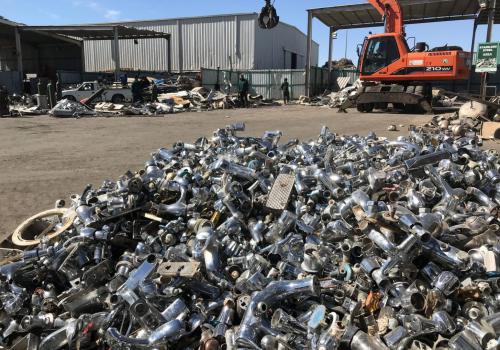Japan's ferrous scrap exports in September rebounded by 11.4pc from the previous month to 747,240t. But they still remained off this year's first-half pace as firmer domestic demand kept more supplies in its home market. Japan averaged 814,056 t/month of ferrous scrap exports in the first half. But a steady recovery in its domestic demand and rising domestic scrap prices has reduced its competitiveness in seaborne markets. The H2 purchase price at the Tokyo Steel Utsunomiya plant rose by 21pc, or ¥4,500/t ($43/t), to ¥26,000/t from mid-July until the end of August and remained stable afterwards. Japanese steel mills are expected to need more scrap in November to fulfil more orders as sales for construction steel are strong. Exports are expected to edge lower with the firm domestic demand. Vietnam remained the top destination for Japanese scrap in September, even as its volumes slipped by 6pc from the previous month to 270,912t. Overall scrap demand from Vietnam is expected to remain strong as new capacity increases its crude steel production, with output at a record 2.32mn t in September.
Vietnam's import scrap demand is supported by mills that have sustained steel export business and are relying on blast furnaces or induction furnaces with lower production costs. Narrowing margins have forced many electric arc furnace mills out of seaborne scrap markets to solely rely on domestic scrap. Exports to South Korea rose to 251,802t in September, up by 40.7pc from the previous month. Many South Korean mills turned to seaborne scrap after domestic scrap prices started to rise from the end of July through to August. But January-September imports remain 26pc below the same period last year as a result of a slowdown in construction and manufacturing during the Covid-19 pandemic. Bangladesh surpassed Taiwan to be the third-highest destination of Japanese scrap in September at 104,226t. Bangladesh's rising steel production capacity and higher workable price levels have made it an expansion target for Japanese suppliers. Exports to Taiwan nearly halved to 48,566t but still rose by 26.4pc from a year earlier. Taiwanese mills slowed purchases during a rapid increase in seaborne scrap prices, reducing September imports from all origins down by 34pc from the previous month. The Argus HMS 1/2 (80:20) containerised cfr Taiwan assessment rose from $230/t in mid-July to $284/t in mid-September.
Japan's domestic scrap supplies have tightened with increased demand from its mills, with domestic scrap suppliers in no rush to export. There is little incentive for Japanese exports to lower offers even as interest ebbs for Japanese scrap. The appreciation of the Japanese yen against the US dollar from the end of July was another factor that dented the export appetite of Japanese suppliers. Japan's manufacturing sector has been in contraction for a record 18 months. But a key indicator has increased for five consecutive months, with the au Jibun Bank Japan manufacturing purchasing managers' index rising to 48.7 in October.
